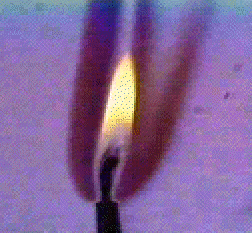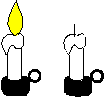
How about FIRE?
| MadSci Network: General Biology |
There are many ways to interpret your question about the meaning of life.One way is, what does the word "life" mean when we say that biology is the study of life? Another way is in philosophical or religious terms - what is the meaning of life, of all our individual lives - why are we here, what does it all mean?
Since the question came into the Biology section of the Mad Scientist Network, I will respond first to the question in a Biology context. Then, I will expand that to the broader question that you might be asking, then give some links and books to pursue that broader question further.
The Meaning of LIFE
Starting from a Biological Viewpoint
The 1997 Random House College Dictionary defines life as:
"The general condition that distinguishes organisms from inorganic objects and dead organisms,
being manifested by
growth through metabolism,
a means of reproduction,
and internal regulation in response to the environment."
Similarly, the 1982 American Heritage Dictionary defines life as:
"The property or quality maintained in functions such as
metabolism,
growth,
response to stimulation, and
reproduction,
by which living organisms are distinguished from dead organisms or from inanimate matter".
So, both of these definitions are similar - life is a property, quality, or condition
that includes metabolism, growth, response to the environment or to stimulation,
and reproduction. Let's clarify these a bit :
Now, most of the things we think of as alive meet those four requirements. We human beings have chemical and physical processes, like breathing and moving our arms and legs. While plants don't breathe, nor move arms and legs, they have chemical processes that use light to make food (photosynthesis) and have physical processes to move water inside, for example.
We human beings grow, until we stop growing. So do plants, and so do single cell organisms such as bacteria.
We human beings respond to the environment. Plants do, too, though often at a slower rate than animals, and often in very different ways - like gradually growing towards light. And, in the extreme case, human beings die, and plants die.
We also reproduce, as do plants, and bacteria. Some living things are incapable of reproduction. For example, mules are sterile - a mule is the offspring of a horse and a donkey, but cannot reproduce itself.
Okay, now - let's see if there are other things that meet these four requirements, that we don't normally think of as a form of life?

How about FIRE?
Metabolism: A flame does
involve chemical processes - in particular, oxidation. It also has physical processes
that move the air in and out along certain paths:
Growth: Let's come back to that with reproduction in a moment.
Response to the environment or stimulation: If you put a flame in a container that cuts off
the flow of air, or suction the air upwards, the flame will seem to try to reach
upwards or in a new direction for air. If you gently blow on a flame from one direction,
it will seem to try to adapt to this environmental change. In the extreme case, a
flame will die.
Ponder that a bit. Shakespeare used flame as an analogy of life in his works - describing the shortness of human life in the words, "...Out, out, brief candle.."Other writers and poets similarly have used the death of a flame as an analogy to the death of other lifeforms. If FIRE is not a form of LIFE, why does a FIRE die?
Reproduction: If you put a candle with a flame in one spot, and bring another candle's
wick in contact with the flame - a new flame is born! Moreover, the new flame starts
out small, then grows until it reaches about the same size as the other flame - so,
in addition to reproduction, we have Growth as well, which I postponed discussing
earlier.
Moreover, the new flame starts
out small, then grows until it reaches about the same size as the other flame - so,
in addition to reproduction, we have Growth as well, which I postponed discussing
earlier.
In fact, some people spend a good deal of effort preventing the reproduction or spread of fires, in forests or in buildings. If fires do not grow or reproduce, why do we need to prevent forest fires and why do we need firemen?
Some people have tried to refine the definition of life, to deal with the issue that
fire meets most of the requirements for the standard definition of life. However,
let's try to handle this a different way.
Let's assume that FIRE
is in fact a form of life
- the least complex form of life. Just as matter is made up of molecules, which are made of atoms, which
in turn are made of subatomic particles -- let's take the range of life, and break it down into similar levels
of complexity.
| Organisms | Organ Systems | Organs | Tissues | Cells | Subcellular: Organelles | |
| Ex: Human being, Dog | Ex: Digestive System, Respiratory System | Ex: Intestines, Lungs, Heart | Ex: Epithelial tissue in intestines | Ex: Epithelial cells | Ex: Mitochondria, Ribosomes |
As we proceed from left to write in this table, we are proceeding into the things that make up the things to the left. Organisms are made of organ systems, organ systems are made of organs, and so on.
Now, let's ask whether we can extend this table a bit. Is there a lower form of life,
below the subcellular, below the organelles like ribosomes that make up cells? Ribosomes
are large molecules that make proteins. This is a chemical process...just as fire
is a chemical process, oxidation. So, perhaps we can put chemical and physical processes,
which are involved in the definition of metabolism, to the right of organelles:
| Organisms | Organ Systems | Organs | Tissues | Cells | Subcellular: Organelles | Metabolism: Chemical and Physical Processes |
| Ex: Human being, Dog | Ex: Digestive System, Respiratory System | Ex: Intestines, Lungs, Heart | Ex: Epithelial tissue in intestines | Ex: Epithelial cells | Ex: Mitochondria, Ribosomes | Ex: Oxidation ( FIRE), manufacture of proteins, copying of DNA |
Now, hopefully all of the above helps to explain the "meaning of life", in a biological sense.
Let's see if we can extend this to the other ways I can interpret your question. Life is a wonderful, and wonderfully complex thing. Is there a reason why something this complex is in existence, and - if so - does that give us clues as to what should be our own individual purposes to our own individual lives?
The Meaning of LIFE -
from a Philosophical or Religious Viewpoint
For several millenium, philosophers, religious thinkers, and people in general have asked variations on the question, "What is the meaning of life?"
This has been asked so often, that there have been humorous responses, including
Monty Python's comedy film, "The Meaning of Life".
In Douglas Adams' "Hitchhiker's Guide to the Galaxy", a race of super-intelligent beings from a very advanced civilization build a huge supercomputer called Deep Thought to answer the question, "What is the meaning of life, the universe, and everything?" Deep Thought computed for 7 and a half million years, and finally produced the rather unhelpful answer of "42".
In Alan Dean Foster's book, "Glory Lane", a group of people
visit an advanced civilization, and inquire similarly of the supercomputer there
what the meaning of life is. The rather surprising answer (except perhaps to teenage
girls) is SHOPPING.
On a more serious note, philosophers have pondered the meaning of life for a long time. Here are some web sites that discuss this in more depth:
http://www.diemersmith.com/books/humanities.htm
Also, religious leaders and religions in general have approached this question. Here is a book that explores the world religions' considerations of the meaning of life:
http://www.oneworld-publications.com/01highlights_new/09meann_life_wrld_rlg.html
Here is a graphic novel on the web that also explores the question:
http://www.thebigquestion.com/index.html
Here is a website that discusses the meaning of life on a more personal level:
http://www.aristotle.net/~diogenes/meaning1.htm
There is a school of thought in psychology that makes the search for the meaning of life, on a personal level, one of the key issues in psychology. Viktor Frankl, a noted Austrian psychologist, developed this theory in his book, "Man's Search for Meaning". Much of the development of his concepts came under the worst imaginable conditions, while Viktor Frankl was imprisoned in Nazi concentration camps. Viktor Frankl has applied his concepts successfully to a number of patients, and has developed a set of ways that an individual can feel that his or her life has meaning, that their life is significant.
However, I cannot resist throwing in one more look at the Meaning of Life in a biological sense. Let's review the spectrum of life described earlier:
| Organisms | Organ Systems | Organs | Tissues | Cells | Subcellular: Organelles | Metabolism: Chemical and Physical Processes |
| Ex: Human being, Dog | Ex: Digestive System, Respiratory System | Ex: Intestines, Lungs, Heart | Ex: Epithelial tissue in intestines | Ex: Epithelial cells | Ex: Mitochondria, Ribosomes | Ex: Oxidation ( FIRE), manufacture of proteins, copying of DNA |
Now, just as we added a column to the right hand side to include chemical and physical processes, perhaps we should consider expanding the spectrum of life on the left hand side. Can we consider a life form that is made up of organisms, like tissues are made of cells?
A group of cells that just happen to be together, but aren't interdependent, is called a Colony rather than a tissue. A tissue is a group of cells that depend on each other, so that the whole is effectively greater than the sum of its parts. Similarly, an organ is made of tissues working together, an organ system is made up of interdependent organs that work together, and an organism is made up of interdependent organ systems that work together making a human being that is effectively greater than the sum of his or her parts.
So, perhaps a group of interdependent people can form a super-organism that is effectively greater than the sum of its parts:
| Groups of Organisms? | Organisms | Organ Systems | Organs | Tissues | Cells | Subcellular: Organelles | Metabolism: Chemical and Physical Processes |
| Communities?Societies? Nations? |
Ex: Human being, Dog | Ex: Digestive System, Respiratory System | Ex: Intestines, Lungs, Heart | Ex: Epithelial tissue in intestines | Ex: Epithelial cells | Ex: Mitochondria, Ribosomes | Ex: Oxidation (FIRE), manufacture of proteins, copying of DNA |
Try the links in the MadSci Library for more information on General Biology.